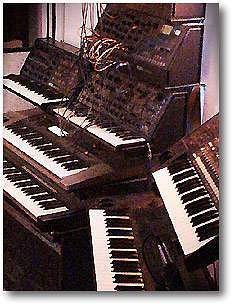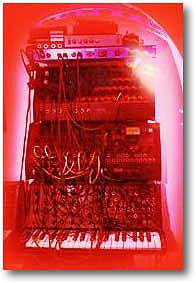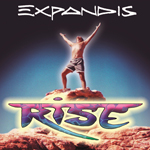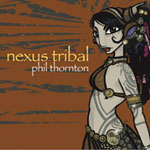Moog Source
A cross between a 'speak and spell' and a Minimoog - very strange!
I love this synth, it has lots of personality in all departments. It's not so
easy to link up to the computer but for hands on stuff it's the best!
Control is via a free turning dial, suitably weighted for spinning (some
parameters take many revs to get from zero to full)! When you hear a subtle
rippling sound on my early stuff it's almost certainly the Source.
Korg MS system
MS20 synth, MS50 synth expander and SQ10 analog sequencer. This has been
the 'core' of my set up for the last 20 years. A much more brittle sound
than the Moog but incredibly versatile. Back then this set up provided all
the rhythm, bass and general backing for the 'Expandis' sound. The patching
system is based around standard jack plugs so adding extra bits such as home
made circuits or guitar pedals or even other instruments is easy to do!

Korg Wavestation and M1r
The Wavestation is my 'controller' keyboard for the midi system as well as
being a great instrument for those lush evolving moments that can only be
improved on by adding a 'slave' patch from the M1r module! On the rare
occasions that I get to use a quadraphonic or surround sound set up the
effect is superb! Before I had a 'sampler' the M1r provided most
of the standard sounds such as choir, oboe, strings, etc, needed for the
early New World albums. Both instruments have great effects sections which I
still use extensively when putting sounds together.
Korg MS2000
When my Korg VC10 vocoder finally died in 2000 this came along as the
perfect replacement. As a vocoder it's great and the synth section is a
revelation as to what the latest generation of 'virtual' synths can do!
This is the first time I have had analog control with a full midi
specification (system exclusive, etc). I'm sure this is going to be fun!
|

Yamaha VL7
When this came out it was a real luxury item, luckily for me it was not
popular and was sold off cheap when it was discontinued. With thousands of
parameters and a monophonic keyboard it is certainly a challenge to work
with! I have however programmed in a few very expressive sounds, in particular the
tibetan horn on 'Alien Encounter' and the oboe on the new version of 'Natural Magic'.
Yamaha DX7
Yamaha with another difficult to program monster! This was my first
polyphonic synth, perfect for the '80s and still useful once in a blue moon!
In those days I was happy to climb through the tiny window and get programming, and
it's still nice to play.
E-bow guitar
The e-bow is a small battery powered electromagnet which make the strings
of an electric guitar vibrate allowing violin type sustain. With this and a 'whammy
pedal' pitch bending device it is possible to create anything from a pedal
steel guitar to a flock of seagulls flying over head! I have recently
started using the Korg Toneworks AX1000G effects unit, which has brought me
full circle back to a more traditional approach to the guitar, I've even
started using a plectrum!! This new style is featured on the bonus track on
the 'Illusions' album.
I also use a Hohner 'headless' guitar which can be carried on the shoulder
which, with a couple of plastic recorders and a DAT machine gives me a
great set up for travelling light.
|




















































